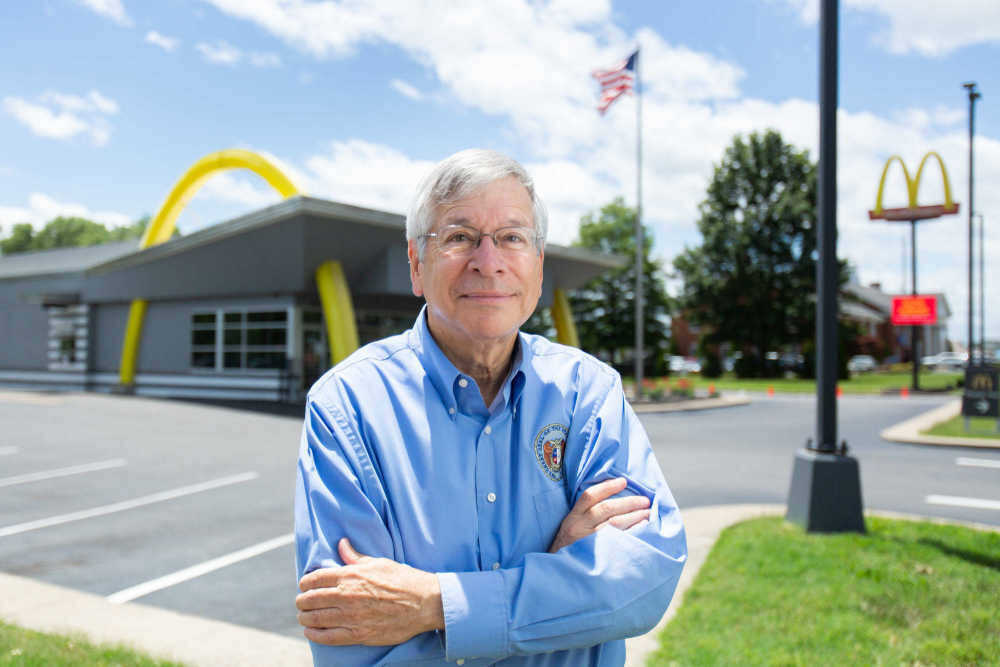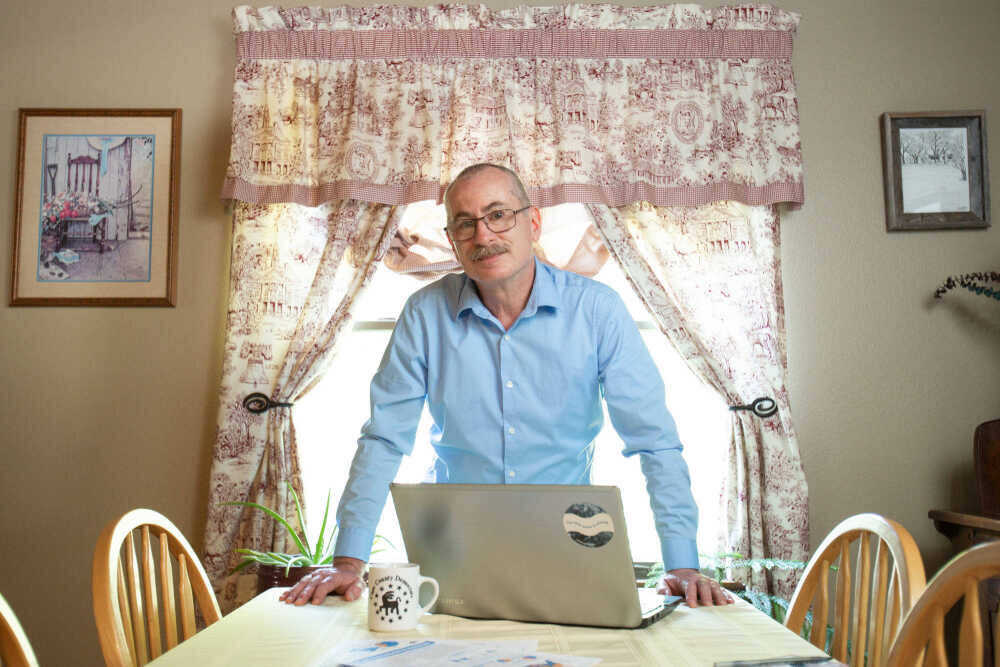Wayne Wallingford interview with B Magazine

There are a number of important political races in our area this year, a few, because of term limits, pitting talented individuals against each other in districts without an incumbent. The following interview is with State Senator Wayne Wallingford (R-Cape Girardeau), who is running for House District 147 in Cape Girardeau. Wallingford answered questions from B Magazine and provided a three-sentence self-introduction. To read interviews with other candidates profiled in B Magazine, click here.
Wayne Wallingford
Republican candidate for Missouri House District 147 Current senator for Missouri Senate District 27
Wallingford: My master's degree is in health care administration, and I worked in two hospitals prior to entering the United States Air Force where I served 25 years as an active duty combat veteran. Since retiring from the Air Force, I've been employed by the two largest restaurant corporations in the world; first in operations and currently as the Chief People Officer (HR). I've served one two-year term in the Missouri House of Representatives and am completing my second four-year term in the Missouri Senate.
How old were you when you had your first job?
Wallingford: I was 16 years old when I got my first job at a manufacturing company. They made chaplets for all three major American automobile companies. A chaplet is a small metal molding made of sheet metal that goes into the production of engine blocks. My father was the plant foreman and to assure the other employees he didn't show any favoritism, he did just the opposite and had me do the most difficult jobs that were undesirable and which no one else wanted to do. I still have all the scars on my hands to prove it! However, in the end, I was the only employee trained to do every job in the factory.
What is an important lesson you learned early in your career?
Wallingford: An important lesson I learned early in my career in the United States Air Force was during flight training. You were expected to be an expert in your job because other people's lives depended on it. You also had to trust your crew and those crews who were flying in close formation to your aircraft.
This was particularly important in Vietnam in December 1972 during Operation Linebacker II. People were amazed that somebody thought the B-52 could survive in the Hanoi area because our B-52s would be absorbing all the North Vietnamese surface-to-air missiles in the most heavily-defended area in the world. I flew into sky-filled nights of Soviet-built surface-to-air missiles that traveled three times as fast as our B-52s. However, due to our expert training and trust in the teamwork of the crews piloting other aircraft in close formation to mine, we were able to successfully accomplish our mission to end the war and bring our POWs back home.
How did you finance college?
Wallingford: I worked at the factory where my father was the plant foreman. The pay was good ($1.15 an hour). I worked nine-hour days and occasionally on Saturdays. On the way home from work on Friday, I would deposit my check into my savings account at the local bank.
I grew up in Illinois and attended college in Nebraska. When I came home during fall break, Christmas and spring break, I continued to work at the factory. Over the summer, I would again work in the factory before returning to college.
In addition, I mowed lawns, raked leaves and shoveled snow to supplement my income from my job at the factory. I also did this at my house, except I didn't get paid since doing chores was expected at home. There was no allowance, either! I self-financed my college education and graduated in four years without any college debt.
Describe the different steps in your career and why you made the choices you did.
Wallingford: My bachelor of science degree is in business administration, and my master's degree is in health care administration.
I was employed by Nebraska Methodist Hospital prior to being commissioned as a Second Lieutenant in the United States Air Force. After completing flight training, I was assigned to a B-52 base and sent to Vietnam. After four years in the B-52, I attended Squadron Officer School and upon graduation was assigned to a base flying RC-135 reconnaissance missions.
Four years later, I was transferred to another Air Force Base where I was the Director of Reconnaissance Air Crew Training for the SR-71 and U-2. During this time, I completed Air Command and Staff College.
After three and a half years, I was transferred to a joint tour working with Air Force, Army, Marines and Navy personnel under the command of the United States Commander-in-Chief for the Pacific. During this time, I completed Air War College.
Three years later, the Air Force gave me a four-year sabbatical as the Professor of Aerospace Science at Southeast Missouri State University. Upon completing my sabbatical, my final assignment was in the United Kingdom, where I served as the Director of Intelligence for the reconnaissance operations in the European and Middle Eastern theaters.
After retiring, my goal was to enter the corporate business world. I interviewed with PepsiCo, and they gave me that opportunity. I was assigned to their Taco Bell Division of the Chicago Headquarters. I was given responsibility for a five-state region. Six years later, I was promoted to their Philadelphia Headquarters. I had the responsibility for corporate and franchised operations for a 16-state territory.
Five years later, McDonald's made me an offer I couldn't refuse. I moved back to Cape Girardeau as the Chief People Officer for 17 restaurants employing over 1,200 people. Because of my strong business and health care background, I was encouraged to run for the Missouri House of Representatives. I was elected and served one two-year term in the House. However, my constituents knew the current state senator would soon term out, so they urged me to run for the Senate.
I am finishing my second four-year term. Now, my constituents are urging me to run for the House of Representatives again. If elected, I could serve a total of six more years. Praying for guidance from the Lord and seeking ways to serve him have always been the main focus of my career.
Tell about one of your favorite books about business, leadership or government. Why should others read it?
Wallingford: I've been reading books on leadership for the past 52 years. The books I find particularly fascinating are books about military leadership. A book that I would recommend is "Extreme Ownership (How U.S. Navy Seals Lead and Win)" by Jocko Willink and Leif Babin, both who served as U.S. Navy Seal officers.
The authors provide combat-proven leadership lessons and dive deep into the most challenging aspects of leading people. They demonstrate how each lesson applies to the battlefield, business and life.
How would you describe your management style?
Wallingford: My management style incorporates equal parts patience, passion and performance. I work longer and harder than others and take a genuine interest in my constituents. I'm extremely adaptable to change and lead with integrity and adherence to a set of values and principles that incorporate honesty. I do the right thing regardless of the circumstances, choosing courage over comfort.
And your vision of your personal public service?
Wallingford: Citizenship comes with the responsibility to serve our nation and is built on certain fundamental rights -- but also responsibilities to give back through public service. Public service is having a heart to care about others and putting their interest above your own. It's important to be a servant leader and focus primarily on the growth and well-being of people and the communities to which they belong. This is especially true when it comes to helping the elderly and those who are disabled.
It's never being out of touch with the needs of others. I see my role as being the go-to force dealing with government hierarchies, red tape and the needless thick layers of bureaucracies. I have been dedicated to public service my entire career whether in the military, serving my church, volunteering for non-profit organizations or in state government.
I'm committed to making Missouri stronger and don't ask myself, "Should I serve?" but rather, "How can I serve?"
What would your colleagues say is your biggest strength? And weakness?
Wallingford: My colleagues in the Missouri Senate would say my biggest strength is my genuine interest in the welfare of my constituents and developing positive, effective working relationships in order to accomplish my goals to help them.
They would also say my weakness is devoting all of my time and attention to my constituents whether it's late at night, on a weekend or holiday. But I believe this is what being a public servant requires. I tell them when I joined the Air Force they took away my watch and shredded my calendar, so I don't know the time of day or day of the week.
Tell about a specific time you faced adversity.
Wallingford: I flew over 300 combat missions in Vietnam, and in combat, you learn to deal with adversity. You are also given opportunities to show courage in the face of adversity. I flew more combat missions during the 11 days of Operation Linebacker II than anyone else. Unfortunately, we lost 15 B-52s during that campaign. Of the 10 deadliest U.S. hostile air actions, Operation Linebacker II is considered the deadliest.
On one of the missions, my aircraft received battle damage but was still able to limp back to the base. I learned that God definitely works miracles in our lives. One thing for sure, your senses are stimulated by adversity during air warfare!
What can state government do to best help businesses and workers?
Wallingford: The best thing state government can do to restore economic growth, create jobs and lift the veil of uncertainty hanging over every business and worker is to eliminate the size, scope, cost and complexity of regulations and red tape. Too many needless and expensive regulations are clearly costing jobs and growth.
Also, keeping taxes low is important so businesses and workers can keep more of their hard-earned pay. Bigger government doesn't mean better government!
Why do you want to serve in government -- right now, at this moment in time?
Wallingford: I want to serve in state government to continue to serve the people of Missouri. I've served in the Missouri Senate with Governor Parson and Lt. Governor Kehoe and have developed a solid working relationship with them and with all department officials, other legislators in both the House and Senate as well as staff.
I am the only senator in my freshman class who was elected into a leadership position. I am currently serving as the Assistant Majority Floor Leader. My proven leadership on numerous committees, my understanding and management of the legislative process, and my experience serving on the Appropriations Committee, which crafts Missouri's $30 billion budget, means I can continue to use my vast experience in state government to serve Missourians.
The ultimate goal of my service is to glorify God.
What message would you tell young people who are just starting their careers about how to be successful?
Wallingford: Building relationships is everything. Success is a team effort. Life is complex. There are thousands of moving parts and personalities, so you have to be able to adapt to change. Find a mentor and never stop learning -- school is never out, so continue to develop yourself. Go beyond what's being asked of you. If you develop a strong work ethic, everyone will want to hire you. Technical skills are important, but people who master the soft skills are irreplaceable.
Finally, be happy and excited and look forward to each day. You can make money or you can lose money, but time you can only lose; spend it carefully.





